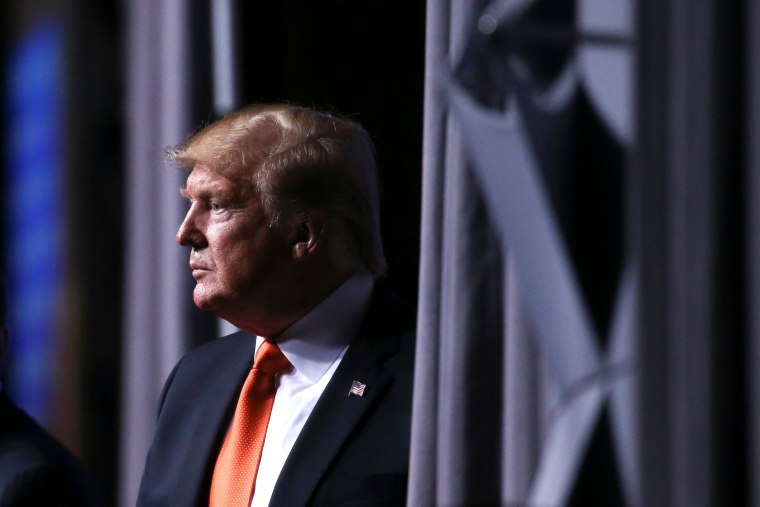The most recent legal salvo in President Donald Trump’s attempt to block House oversight committees from seeing his finances could be a PR headache for the two banks involved.
On Monday, lawyers on behalf of Trump, his business interests and his three oldest children filed suit in federal district court in Manhattan against Deutsche Bank and Capital One in an attempt to block them from complying with congressional subpoenas from two House committees.
The filing characterized investigations by the House's Intelligence and Financial Services committees as politically motivated fishing expeditions, arguing, “The subpoenas are invalid and unenforceable because they have no legitimate legislative purpose.”
Banking experts said that while requests for banks to provide information in cases of suspected wrongdoing aren’t uncommon, the president’s response is.
“Banks are routinely asked to provide information about customers with regard to criminal and civil matters, such as money-laundering, tax fraud, financial fraud, bankruptcy fraud, etc.,” said banking analyst Bert Ely.
“A lawsuit by a customer to prevent banks from disclosing information on a customer, especially a borrower, is unorthodox,” said Michael Moebs, chief executive officer and economist at financial consulting firm Moebs Services. “It would appear to me the Trumps are overtly telling the two banks to protect their privacy.”
Jacob Kirkegaard, a senior fellow at the Peterson Institute for International Economics, said the suit carried an unspoken implication for both banks.
“He’s a vindictive guy and his administration has proved it’s willing to go to rather extraordinary lengths against private businesses to get his way,” he said.
At the same time, Moebs added, customer privacy is a key tenet of any banking relationship and one banks are required to uphold. “Information is at the center of a bank’s underwriting process to make a loan, or even to establish a customer account of any type,” he said. How the suit against Deutsche Bank and Capital One plays out, and how much investigators ultimately learn about Trump’s money, might ultimately hinge on the minutiae of privacy legislation.
Ely pointed out that although they were the parties being sued, the banks’ hands were effectively tied. “Banks have to comply with subpoenas, regardless of what the impact of the subpoena might be,” he said. “A subpoena gives the bank the legal cover.”
But while the two banks might be compelled by the courts to comply, subpoenas wouldn’t protect them in the court of public opinion.
Kirkegaard said the fact that Capital One — which came up in the subpoenas because Trump wrote his disgraced former lawyer Michael Cohen a $35,000 check from an account he held at the bank — is a familiar brand to many Americans is a risk for the company. The perception of being overly accommodative to Trump or congressional Democrats could alienate a wide swath of customers.
“They’re clearly potentially stuck between a rock and a hard place in this very polarized political environment,” he said. “It’s technically a legal case, but ultimately, the risk is mostly political.”
And as Trump’s most prominent, and at times, only bank lender, Deutsche Bank is facing plenty of other challenges already: It faces legal penalties for its role in a years-long Russian money-laundering scheme. Regulators in the U.S. and U.K. have fined the bank billions of dollars for various episodes of wrongdoing.
Most recently, an attempt to merge with rival German bank Commerzbank failed last week, and analysts have been critical.
“As we are unable to credibly plot a better strategic path forward, we believe that Deutsche Bank’s longer-term outlook has worsened,” Goldman Sachs analyst Jernej Omahen wrote in a Monday research note. “The scale of the restructuring challenge remains large,” he said. “And the bank remains vulnerable to external shocks.”
There are indications that Deutsche Bank already could be worried about potential harm to its public image that could come from its proximity to the Trumps. In February, Bloomberg reported that bank officials debated extending the terms of $340 million in outstanding loans owed by the Trump Organization until Donald Trump would no longer be president. The report was dismissed as “nonsense” by Eric Trump, the president's son.
These two companies could be the face of this power struggle for some time, especially considering the prospect of a lengthy appeals process. “If the banks stick to the privacy laws but are forced by the courts to relinquish information, this could go to the Supreme Court,” Moebs said. “This could turn out to be a very big issue.”
